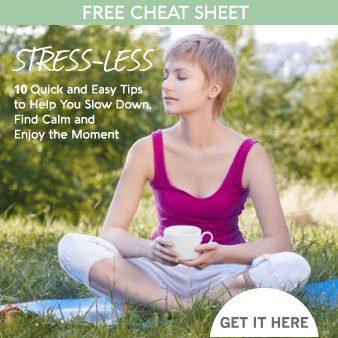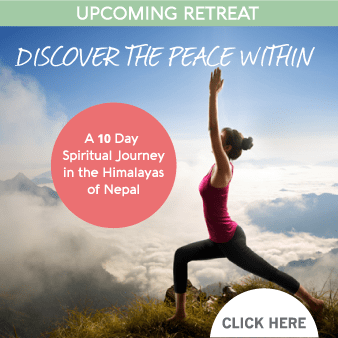
You may not know this about me, but I used to suffer from anxiety bad.
Like end up in the emergency room, all day vomiting, bad. (Sorry if that’s TMI!)
And on my journey to “healing” my anxiety, I’ve come to believe that some of us are more highly sensitive, and thus naturally more prone to anxiety. We all have our weaknesses right? For some it might be back troubles, others migraines and for people like you and I, it’s a nervous system that can tip into anxiety more easily if it’s not well-regulated.
And just like a diabetic needs to watch their sugar or the person with allergies needs to avoid their triggers, us anxious types need to watch our stress levels. In other words, we need to take care of our nervous systems, on the daily, to PREVENT full-blown anxiety from occurring. (Remember the old adage, prevention is better than cure? It totally applies to anxiety too.)
So now I know, even though (touch wood) I haven’t had severe anxiety for many years now, that I have to keep up with caring for my nervous system. And there’s a few things I do for that but I wanted to share 3 key ones with you, in the hopes that they may inspire you too to take this “prevention is better than cure” approach to your own mental wellbeing.
1. Daily Mindfulness Meditation
I was a sporadic meditator before my bouts of severe anxiety. It was something nice to do when the mood struck. But after that ED visit, I realised it had to be a “must-have” not a “nice-to-have” part of my routine. It’s helped immensely. One of the main ways mindfulness helps with anxiety is it trains you to observe your thoughts, feelings and body sensations rather than get caught up in them.
Often with anxiety our thoughts can spiral out of control causing panic or physical anxiety. Scary symptoms like a racing heart or hyperventilation can make us even more anxious. Mindfulness trains you to be able to notice these thoughts and sensations without freaking out and adding more fuel to the fire. It reminds you that you’re not your anxious thoughts or feelings, and that they’ll pass, so it’s all ok.
Mindfulness has the cold, hard science behind it too. One study found that 8 weeks of daily mindfulness meditation reduces anxiety and depression by 50%.
Even just 10 minutes a day can make a difference, if you want to give it a try I’ve got a few short guided meditations here:
10 Minute Guided Meditation to Calm the Mind
Guided Meditation for Surrendering and Letting Go
2. I Eat An Anti-Anxiety Diet
Does that sound weird to you? A lot of people are completely unaware of how much diet can affect their anxiety. For me, it has a big impact. Thankfully, this too is becoming much more well-recognised and studied, and for depression as well. There’s several layers to this, which I outline in my free Anti-Anxiety Diet Guide which you’re welcome to download, but suffice to say, your stress hormones can be turned up to the max if you’re eating the wrong foods. And after just a few days of eating an anti-anxiety diet, most people feel noticeably calmer, more positive, more energised and more alert.
3. SLEEP (ha!) I Practice Yoga Regularly
Before I had my son, I would have said I prioritise sleep as my number 3, as often my anxiety has been really exacerbated if i’m underslept or burnt-out. But, now I have a toddler and it’s literally been 2 years since I’ve had a full night’s sleep (*excuse me while I weep silently with my head on my keyboard for a moment*)
Anyhoo, good sleep is a thing of the past for me at this stage, and I actually did worry my anxiety would come back as a result. Thankfully it hasn’t, but it’s been all the more important to do everything else I can for my nervous system because I can feel dysregulated way more easily if I dont, now that I’m a zombie-mama.
So another key thing for me is yoga. As a yoga teacher I was already practicing yoga before I had a baby, but I use it way more…how should I say? Medicinally, now. I sprinkle it throughout my day to keep my stress hormones on the down-low…Bubba having his nap? Great, I’ll take 20 minutes to do a few restorative poses and deep breathing. Have a spare hour at night? I’ll do a full practice as my self-care. Have a rare day to myself? I’m hitting the yoga studio (and then going op shopping, getting a massage or seeing a long-lost friend!)
While yoga is related to mindfulness, as it’s a form of mindful movement, for me the two are a little different in their effects. Mindfulness meditation, I feel, helps me more on the mental level in relating to my stress better and being less reactive. Whereas the yoga I feel has a more physical impact, tangibly relaxing my body, helping me feel more grounded and releasing muscular tension. Yoga also enhances interoception, which helps us to feel more like “ourselves” again. (So important after a baby!) Obviously the two together are gold, which is why I practice both. Like mindfulness, you don’t have to start with super-long sessions. I have a 25 min yin yoga taster class here.
So there you have it…the 3 self-care practices I have to care for my anxiety-prone nervous system. Hopefully I’ve inspired you to take a “prevention is better than cure” attitude to your mental wellbeing. In the comments below, I’d love to hear from you! Do you have any essential self-care practices that really help your anxiety? Are you keen to try any of mine? Let me know.














Leave a reply